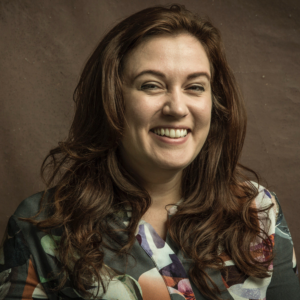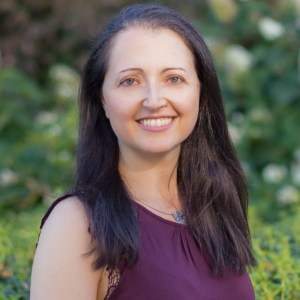What does the near future holds for us? What will the impact of technologies like AI and robotics be?
Watch our discussion about what the near future holds for us, with Dr Beth Singler, Junior Research Fellow in Artificial Intelligence at the University of Cambridge, Prof Praminda Caleb-Solly, Professor of Assistive Robotics and Intelligent Health Technologies at the University of the West of England, Dr Anat Caspi, director of the Taskar Center for Accessible Technology, University of Washington, and Dr Chanuki Seresinhe, visiting data science researcher at The Alan Turing Institute.
Our speakers
Dr Beth Singler
Junior Research Fellow in Artificial Intelligence at Homerton College, University of Cambridge
 Dr Beth Singler is the Junior Research Fellow in Artificial Intelligence at Homerton College, University of Cambridge. Beth’s research explores the social, ethical, philosophical, and religious implications of advances in AI and robotics. She likes to say that she ‘thinks about what you think about machines that might think’. Beth has produced a series of documentaries on AI, and the first, ‘Pain in the Machine’, won the 2017 AHRC Best Research Film of the Year award. She was one of the Evening Standard’s Progress 1000 in both 2017 and 2018, and in 2020 she was one of the 21 to Watch. She has spoken at the Hay Festival, the Edinburgh Science Festival, Ars Electronica, and New Scientist Live, and appeared on BBC Radio 4, and BBC Click.
Dr Beth Singler is the Junior Research Fellow in Artificial Intelligence at Homerton College, University of Cambridge. Beth’s research explores the social, ethical, philosophical, and religious implications of advances in AI and robotics. She likes to say that she ‘thinks about what you think about machines that might think’. Beth has produced a series of documentaries on AI, and the first, ‘Pain in the Machine’, won the 2017 AHRC Best Research Film of the Year award. She was one of the Evening Standard’s Progress 1000 in both 2017 and 2018, and in 2020 she was one of the 21 to Watch. She has spoken at the Hay Festival, the Edinburgh Science Festival, Ars Electronica, and New Scientist Live, and appeared on BBC Radio 4, and BBC Click.
Follow Beth on Twitter @BVLSingler
Anat Caspi
Director of the Taskar Center for Accessible Technology, University of Washington
 Dr Anat Caspi designs for the fullness of human experience, guided by the belief that designing technology for heterogeneous populations necessarily requires mixed practices of participatory design, qualitative and quantitative methods. Her research interests are in the areas of applied machine learning, ubiquitous computing and contextually aware robotic systems. She is the Director of the Taskar Center for Accessible Technology at the Paul G. Allen School for Computer Science & Engineering (located at the University of Washington). The Center’s mission is to develop, translate and deploy technologies with a focus on benefiting individuals with disabilities. TCAT has been developing open source universally accessible technologies in the areas of transportation, mobility and contextually-aware, responsive environments for the past five years. Through this work, Dr. Caspi has co-designed, developed and evaluated sensor and mobile applications for personalized navigation and routing in pedestrian ways (visit Accessmap.io) and improving personal automated assistive devices (as in developing autonomous wheelchairs and robotic feeding systems). Dr. Caspi was named Changemaker by president Obama in 2016 and received the Northwest Access Fund Technology Innovation Award in 2017. She earned her PhD in bioengineering from the joint program in bioengineering at University of California Berkeley and San Francisco, and her Masters and Bachelor degrees in computer science and feminist studies from Stanford University.
Dr Anat Caspi designs for the fullness of human experience, guided by the belief that designing technology for heterogeneous populations necessarily requires mixed practices of participatory design, qualitative and quantitative methods. Her research interests are in the areas of applied machine learning, ubiquitous computing and contextually aware robotic systems. She is the Director of the Taskar Center for Accessible Technology at the Paul G. Allen School for Computer Science & Engineering (located at the University of Washington). The Center’s mission is to develop, translate and deploy technologies with a focus on benefiting individuals with disabilities. TCAT has been developing open source universally accessible technologies in the areas of transportation, mobility and contextually-aware, responsive environments for the past five years. Through this work, Dr. Caspi has co-designed, developed and evaluated sensor and mobile applications for personalized navigation and routing in pedestrian ways (visit Accessmap.io) and improving personal automated assistive devices (as in developing autonomous wheelchairs and robotic feeding systems). Dr. Caspi was named Changemaker by president Obama in 2016 and received the Northwest Access Fund Technology Innovation Award in 2017. She earned her PhD in bioengineering from the joint program in bioengineering at University of California Berkeley and San Francisco, and her Masters and Bachelor degrees in computer science and feminist studies from Stanford University.
Follow the Taskar Center on Twitter: @TaskarCenter and Facebook.
Dr Chanuki Illushka Seresinhe
Director of Data Science at Culture Trip, visiting researcher at the Alan Turing Institute
 Dr Chanuki Illushka Seresinhe is the Director of Data Science at Culture Trip, a global startup operating in experiences and travel, media and entertainment. She is also a visiting researcher at the Alan Turing Institute where she uses big online datasets and deep learning to understand how the aesthetics of the environment influences human wellbeing. For example, how might we design our future cities to be conducive to our wellbeing? Her research has been featured in the press worldwide including the Economist, Wired, The Times, BBC, Spiegel Online, Guardian, Telegraph, Scientific American, Newsweek and MIT Technology Review. Prior to embarking on her PhD, Chanuki had a successful design career that included running her own digital design consultancy for over eight years.
Dr Chanuki Illushka Seresinhe is the Director of Data Science at Culture Trip, a global startup operating in experiences and travel, media and entertainment. She is also a visiting researcher at the Alan Turing Institute where she uses big online datasets and deep learning to understand how the aesthetics of the environment influences human wellbeing. For example, how might we design our future cities to be conducive to our wellbeing? Her research has been featured in the press worldwide including the Economist, Wired, The Times, BBC, Spiegel Online, Guardian, Telegraph, Scientific American, Newsweek and MIT Technology Review. Prior to embarking on her PhD, Chanuki had a successful design career that included running her own digital design consultancy for over eight years.
Professor Praminda Caleb-Solly
Professor of Assistive Robotics and Intelligent Health Technologies, University of the West of England
 Praminda Caleb-Solly is Professor of Assistive Robotics and Intelligent Health Technologies in the Faculty of Environment and Technology at the University of the West of England and Theme Leader for Assisted Living at the Bristol Robotics Laboratory. She has over 18 years of teaching and research experience working on externally funded projects with partners from a diverse range of commercial and industrial enterprise.
Praminda Caleb-Solly is Professor of Assistive Robotics and Intelligent Health Technologies in the Faculty of Environment and Technology at the University of the West of England and Theme Leader for Assisted Living at the Bristol Robotics Laboratory. She has over 18 years of teaching and research experience working on externally funded projects with partners from a diverse range of commercial and industrial enterprise.
Her multi-disciplinary background, underpinned by degrees in Electronic Systems Engineering, Biomedical Instrumentation Engineering and a PhD in Computer Science, enables her to address technical issues from a soft systems perspective in relation to human experience of technology in different contexts. Her current portfolio of projects includes assistive robotics technology to support older adults with ageing-related impairments, intelligent data processing for smart home sensing, sensor systems for understanding children’s use of powered mobility and adaptive interfaces for driverless cars. She has also co-designed an app for self-management of anxiety, SAM.
Follow Praminda on Twitter @Praminda